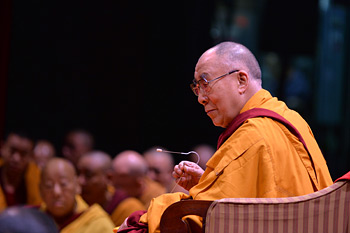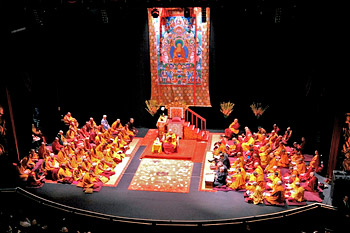The Essence of True Eloquence - Second Day
New York, NY, USA, 4 November 2014 - His Holiness the Dalai Lama lost no time after arriving in the historic Beacon Theater this morning. He saluted the Buddha, took his seat in a comfortable chair and recited the Heart Sutra at a crisp pace before resuming his reading of extracts from Tsongkhapa’s ‘Essence of True Eloquence’.
“In his ‘Praise to Relativity’ Tsongkhapa says of the Buddha, ‘Whatever you have taught is based on dependent origination. Nothing in your teaching does not contribute to freedom.’ Dependent origination is a principal element of the teaching. It can be found implicit in the cause and effect of the fundamental teaching, the Four Noble Truths.” 
| His Holiness the Dalai Lama preparing to speak at the start of the second day of his two day teaching at the Beacon Theater in New York, NY, USA on November 4, 2014.
Photo/Sonam Zoksang
|
His Holiness pointed out that of the three non-theistic spiritual traditions of ancient India that accept causality, a branch of Samkhyas, Jainism and Buddhism, it is only Buddhism that teaches no-self. He said that in the second turning of the wheel of dharma, the teachings of the Perfection of Wisdom, the notion of no-self is brought to another level in terms of cause and effect and dependent origination or dependent designation. Effect is dependent on cause, but cause is also dependent on effect. There is a mutual dependence, as there is between parts and the whole. Dependent origination is subtly implicit in the use of language of dependent designation.
Understanding of dependent origination, and with it understanding of emptiness, ensures achievement of high status, good rebirth, and definite goodness. His Holiness quoted Chandrakirti’s use of conditionedness which undermines any sense of intrinsic existence. He said:
“Looking at all of you, I see colleagues who all look so real as if you exist in your own right. But if I think of what I see in terms of Chandrakirti’s mere conditionedness, I understand that your existence is dependent on many other factors.
“I don’t claim to have realized emptiness, but I’m almost there. I can assure you that if you study, meditate and put in the effort, it has the power to transform. I think of myself as just another human being, not as His Holiness the Dalai Lama; if you too put in the effort, you have the opportunity to transform your mind.
“Understanding emptiness is tough, but don’t complain about that to me, take it up with the Buddha. I want to share my experience with you. My interest in emptiness goes back to when I was about 17 or 18 years old. I was close to one of my debate assistants a Mongolian named Ngodrup Tsoknyi. He was from Sera Jey. Up until my final exams in March 1959, I had several other texts to study too. My plan was to visit Southern Tibet, as the 13th Dalai Lama had done, and I thought that would give me the opportunity to study this text, ‘Essence of True Eloquence’ again. But after the events of 10th March, everything completely changed. Because of the desperate situation, we decided to go.
“In India I did study the text again, contemplating it and studying it in the context of other books. In about 1980, when Kyabje Ling Rinpoche was still alive, I met him and shared with him the progress I had made in coming to understand emptiness. We have a custom of offering our understanding to the teacher. He listened carefully and remarked, ‘You will become a yogi of space’ meaning you will realize emptiness.”
 | | A view of the stage at the Beacon Theater during the second day of His Holiness the Dalai Lama's two day teaching in New York, NY, USA on November 3, 2014. Photo/Sonam Zoksang |
His Holiness cautioned against expecting change to come quickly, saying that it might take 30 years, but to keep trying. Since we believe in life after life, we may have to try again next time. His Holiness remarked that he has noticed that some top scholars find difficult what he finds easy, which he attributes to propensities from having studied in previous lives. He counselled older people not to think “Now I’m old, there’s no point in studying.” He said that up to the final breath, it is still worth studying. Whether or not to make the effort is up to the individual. Even at the time of the Buddha there was no sense that everyone should become a Buddhist. The main point, however, was to be a good human being.
Turning to the text again, he mentioned that the ‘Teaching of Akshayamati Sutra’ is an authority for Madhyamakas to differentiate which teachings are interpretable and which definitive. In brief, those sutras teaching about conventional reality are interpretable; those teaching about ultimate reality, for example through the three doors of liberation, emptiness, signlessness and wishlessness, are definitive.
Tsongkhapa writes: “interpretable and definitive correspond to superficial and ultimate, which (correspondence) is illustrated in the ‘Facts of the Stages’ declarations of the four reliances; reliance on the teaching and not the teacher, reliance on the meaning and not the words, reliance on the definitive meaning and not the interpretable meaning and reliance on the noble wisdom and not on (ordinary) consciousness.”
His Holiness touched on issues like the process of cause and effect and the implications of the simultaneous cessation of the cause with the arising of the effect. He also mentioned that emptiness is a mere negation, an exclusion. A non-implicative negation suggests nothing, whereas an implicative negation implies something else.
He gave the example that if you are afraid of something such as snakes and someone declares “There are no snakes here”, that has the power to allay your fear. If, on the other hand, they say, “There are no snakes here, but...” that power is lost because of something else implied. Clearly, simple negation has power.
With regard to production and destruction, Tsongkhapa quotes Nagarjuna as responding to the challenge “if everything is empty, there will be no production and no destruction and the consequence of the non-existence of the Four Noble Truths will be inevitable for you!” by retorting “If everything is not empty, there will be no production and no destruction, and the consequence of the non-existence of the Four Noble Truths will be inevitable for you!” He further quotes Nagarjuna saying, “The Muni declared - ‘All these things are only mind’ in order to eliminate the fears of emptiness among the naive. That is not the reality (of things).”

| Some of the almost 3,000 people attending the second day of His Holiness the Dalai Lama's two day teaching at the Beacon Theater in New York, NY, USA on November 3, 2014. Photo/Sonam Zoksang
|
His Holiness mentioned that the Buddha makes clear that it is not the case that form is made empty by understanding of emptiness. Form has to be understood as being empty, as the ‘Heart Sutra’ says: Form is emptiness, emptiness is form.
In the text Tsongkhapa quotes Chandrakirti executing an exceptional negation by means of four consequences. The consequence that the noble equipoise would destroy phenomena; the consequence that conventional reality could withstand analysis; the consequence of the non-negation of ultimate production and the wrongness of the scriptural statement that things are empty by intrinsic reality. Chandrakirti quotes the ‘Kashyapa Chapter’ as saying “the Middle Way is the genuine insight into things; it does not make things empty by means of emptiness, but (realizes that) the very things themselves are emptiness.
As he came to the end of his complex explanations, His Holiness repeated that the heart of Nagarjuna’s teachings is dependent origination. True understanding of emptiness is in terms of dependent origination. It is dependent origination that allows for the Middle Way. He quoted Tsongkhapa’s conclusion;
I revere from the depths of my heart
All the excellent elucidations of these,
The Ornaments of the Sages of this world.
Who is there who would not hold supreme
The most excellent system of Nagarjuna.
The intelligent who wish to win such buddha-honors
Should immerse themselves in this clear exposition,
And purify the eyes of their intellects
With the path of philosophical reason.
To this His Holiness added the admonition from the end of the ‘Three Principles of the Path’,
Son, when you realize the keys
Of the Three Principles of the Path,
Depend on solitude and strong effort,
And quickly reach the final goal.
His Holiness laughed and said:
“Now it’s complete. My responsibility is done. Now the responsibility lies with you to study, think and generate experience of what you have learned.”
Bob Thurman stepped forward to offer some words of thanks. Firstly, he offered profuse thanks to His Holiness for coming and teaching; he thanked his fellow sponsors Joshua and Diane Cutler of the Tibetan Buddhist Learning Center that was established in 1958 by Geshe Ngawang Wangyal, their mutual teacher. He thanked the hard working staff of Tibet House, the Office of Tibet and the Beacon Theater. All of this was applauded, but when he thanked Geshe Thubten Jinpa for clearly rendering His Holiness’s teachings into English, the theatre filled with rousing cheers.
Tomorrow, His Holiness leaves to return to India.  http://www.dalailama.com/
|